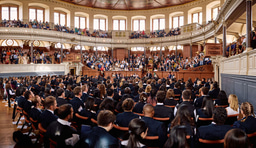
Knowledge, wisdom and the natural world: Female intellectuals in the 12th century
I’m a second year history undergraduate at Durham University and first cohorts of Laidlaw scholars at Durham University.
I’ve found that the scholarship itself was a fantastic opportunity; on top of that it gives a fantastic springboard to do other things. To have being a Laidlaw scholar on your CV, and having the skills and experience that you learn through it makes it much easier to apply to things that you want to do. I’ve been successful in becoming an ambassador for Gale publishing in Durham, partly because of my background as a Laidlaw scholar, I’ve also successfully applied to study in Tubingen this year over the summer, and at Heidelberg next year. Being a scholar has certainly helped my applications to secure places in these summer schools, both of which are in Germany. I’ve also been able to build networks which have allowed me to work, or at least, visit, academics that I know in Berlin next year, and I’m using some of my Laidlaw grant to support working with a friend of mine in Gottingen.
Leadership
I found the leadership aspect of the course really helpful. I was initially interested in the programme for the research side of things, but once I arrived and found the leadership elements, I was bowled over by the benefits. We did some stuff on self assessment and “self knowledge” – about how we as individuals worked best in a team, which I thought was really helpful as I’d never done anything like that before. Turns out I’m the kind of person who likes coming up with ideas, which I sort of knew already, but I had never had anybody say “Right, and this is how you should respond to that”.
Research
My focus is looking the way that women wrote about the natural world during a period known as the 12thcentury renaissance and then looking at whether or not the fact that they’re women is significant. I’ve been fortunate enough to present a paper at an international research conference – I was able to draw on my research into an Abbess called Hildegard of Bingen, and compare her to the 13th century bishop, theologian, and arguably scientist, Robert Grosseteste. I was able to present my comparison as a paper, as an undergraduate, at an international conference, to a room full of people who knew vastly more about the subject than I did, and that’s the kind of thing that I would not have been able to do without my scholarship and has been fantastic both for my career prospects - as I’m looking to become an academic - and also, simply, for my self esteem. I’m now much more likely to go and suggest ideas and be a bit more confident, which I wouldn’t have been otherwise.
Networks
I’ve found that I’ve developed both social and professional connections through the Laidlaw scholarship. Firstly, within the university, being a Laidlaw scholar has encouraged me to get much more involved in my department. I’ve ended up on the committee of the university History Society and because of that I’m now familiar with lots of people in my department both academics, and students, so my network there is quite broad and extensive. Also, because we are the first year of Laidlaw scholars, there wasn’t a network to plug into already, but what the Laidlaw society has really tried to focus on is building that sense of a Laidlaw scholarly community within Durham and are continuing build on that.





Please sign in
If you are a registered user on Laidlaw Scholars Network, please sign in